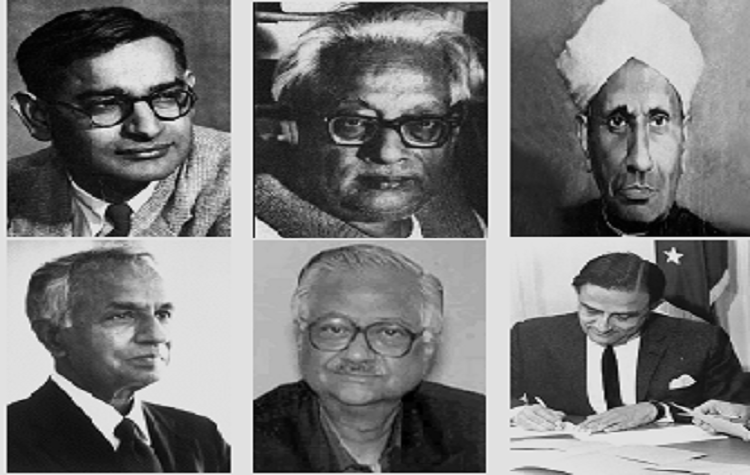The advancement in the field of Science & Technology, esp. in the past few years, has been phenomenal. But do you know that many inventions that we see today have become possible due to Indian scientists? In this article, we highlight 10 such Indian scientists who contributed immensely in this field.
While Shanti Swarup Bhatnagar, Homi Jehangir Bhabha, Vikram Sarabhai are well-known in building India’s post-independent Science & Technology infrastructure as well as policies, Sir Jagdish Bose, Satyendra Nath Bose, Aryabhata and others are popular for their discoveries which changed the way we look at world. Read below to know more about them and others:
1) Aryabhata
Indian astronomer and mathematician, he was born in 476 A.D., and adorned the court of Chandragupta Vikramaditya. His book, Aryabhatiya, is well-known for his work in the field of mathematics (mensuration, arithmetic and geometric progressions, etc) and astronomy (geometric/trigonometric aspects of the celestial sphere, shape of the earth, reason behind day and night, etc.).
2) Sir Jagdish Chandra Bose
He is credited to be the first person to put India on the science-map of the world by his inventions. Crescograph, an instrument for measuring growth in plants, was developed by him. He also showed that plants respond to light rays and wireless waves. While his scientific prowess is well-known, not many know that he was a good writer as well. He has authored two famous books – Response in the Living and Non-living (1902) and The Nervous Mechanism of Plants (1926).
3) Sir C.V. Raman
He is the first Indian to get Nobel Prize in Science. He was awarded the Nobel for Physics in 1930 for his discovery, ‘Raman Effect.’ He also gave the world the theory of the blue colour of ocean and theory of musical instruments. Founder of the Raman Research Institute, he was also the recipient of the Lenin Peace Prize in 1958.
4) Satyendra Nath Bose
Well-known for the Bose-Einstein statistics (B–E statistics), a type of quantum statistics which he developed together with Albert Einstein. The particles which obey B–E statistics are known as ‘bosons’ (named after him). He was awarded Padma Vibhushan in 1958 for his invaluable work.
5) Dr Homi Jehangir Bhabha
An eminent cosmic ray scientist, Dr Bhabha is mostly known as the chief architect of India’s nuclear programme. He established two popular research institutions in India, namely the Tata Institute of Fundamental Research (TIFR), and the Atomic Energy Establishment at Trombay (which was renamed as the Bhabha Atomic Research Centre (BARC) after his death). He is also remembered for his work in identifying the elementary particles called mesons.
6) Dr Vikram Sarabhai
Well-known in the field of cosmic rays, Padma Bhushan Dr Sarabhai is credited to have put India on the international map in the field of space research. He was the brain behind the formation of the Physical Research Laboratory, which is considered to be a cradle of Indian Space programme. Born in a business family, his range of interests varied from textiles to nuclear power, and pharmaceuticals to electronics.
7) Dr Shanti Swarup Bhatnagar
Popular for his work on magneto-chemistry, Dr Bhatnagar opened a chain of National Research Laboratories in India. He was the Founder Director of the Council of Scientific and Industrial Research (CSIR). It is in his name that Shanti Swarup Bhatanagar Memorial Award was instituted in 1958. The award is given for the outstanding contributions in Physics; Chemistry; Biology; Engineering; Earth, Atmosphere, Ocean and Planetary Sciences; Medicine and Mathematics to Indian scientists.
YOU MAY LIKE TO READ: Science in everyday life
8) Prof Subrahmanyan Chandrasekhar
Nephew of Sir C.V. Raman, he is best known for the discovery of Chandrasekhar Limit. The formulation of the Chandrasekhar Limit led to the discovery of neutron stars and black holes; and plays a crucial role in understanding the stellar evolution. For his outstanding researches in the field of Astronomy, he (jointly with the nuclear astrophysicist W.A. Fowler) was awarded the Nobel Prize in Physics in 1983.
9) Dr Hargobind Khorana
Indian-born world renowned biochemist, he was awarded the Nobel prize in 1968 in Physiology and Medicine (along with M.W. Nirenberg and R.W. Holley) for developing the method of synthesis of DNA and RNA. He has also been awarded Padma Bhushan by the Government of India.
10) Dr Raja Ramanna
Well-known nuclear physicist, he is credited to have played an important role in placing the country’s indigenous nuclear capabilities on a firm footing. He was associated with India’s first peaceful nuclear experiment at Pokhran on May 18, 1974.
Do you feel strongly about something? Have a story to share? Write to us at info@thepeepertimes.com or connect with us on Facebook or Twitter or LinkedIn



